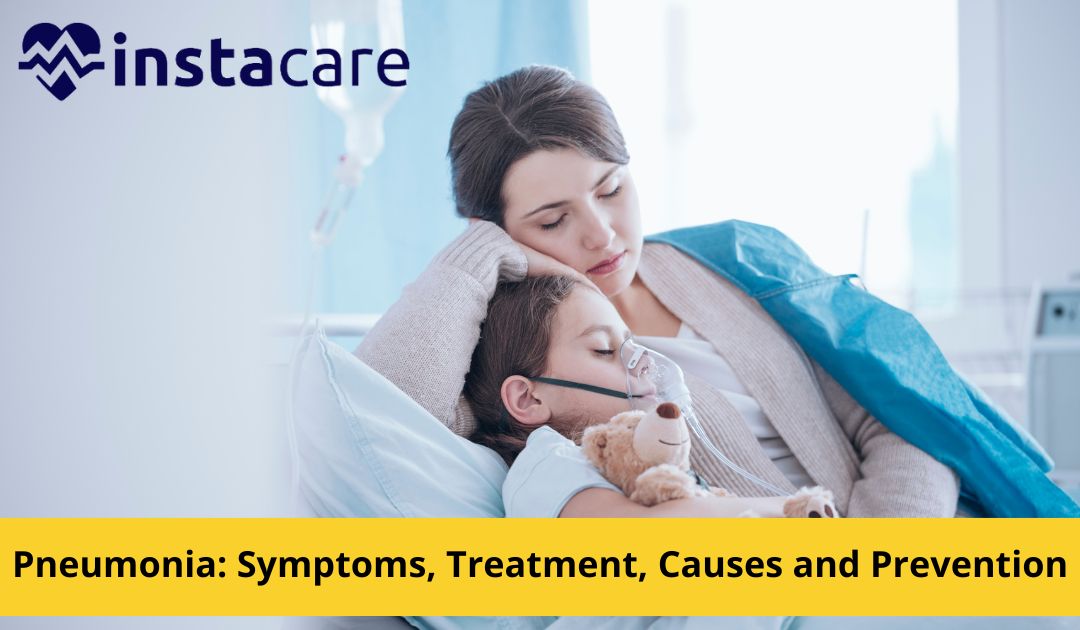Pneumonia is a highly contagious disease that causes lung inflammation. In short, our lungs become distended or even the pus-filled alveoli, or air sacs, are evident. These pus-filled air sacs also might cause swelling, which would then cause wheezing and itching in the throat. In addition to the fever, the patient also experiences chills and difficulty breathing.
Numerous organisms, such as bacteria, viruses, and fungi, can cause pneumonia. Pneumonia can range in severity from mild to potentially fatal. Infants and young children, seniors, people with health conditions, and weakened immune systems are the most vulnerable demographics.
Who Is Susceptible To Pneumonia?
Pneumonia can affect anyone. However, the following demographics are most at risk
- Seniors 65 years and older
- Children under the age of two
- Individuals with specific medical conditions
- Those who smoke
Causes
Pneumonia has more than 30 different causes, which are categorized as causes of pneumonia
Numerous germs can bring on pneumonia. In the air we breathe, bacteria and viruses are the most prevalent. Usually, your body protects you from these germs getting into your lungs. But even if your health is generally good, these germs occasionally have the power to overwhelm your immune system.
Types of pneumonia
According to the types of germs that cause it and how you contracted the infection, there are different types of pneumonia.
Public-Health Pneumonia
The most typical type of pneumonia is community-acquired pneumonia. It happens outside of medical facilities like hospitals. It might result from:
View More: Kidney Stones Causes Symptoms And Treatment
Bacteria
Streptococcus pneumonia is the most frequent cause of bacterial pneumonia in the United States. This pneumonia can develop independently or following a cold or the flu. Lobar pneumonia is a condition that can only affect one lobe of the lung.
Organisms Resembling Bacteria
Mycoplasma pneumoniae can also bring on pneumonia. Compared to other types of pneumonia, it typically causes fewer severe symptoms. This type of pneumonia, which isn't powerful enough to require bed rest, is known informally as "walking pneumonia."
Fungi
People with weak immune systems or chronic health conditions are more likely to develop this type of pneumonia, as are those who have inhaled high doses of the microorganisms. It is caused by fungi that are found in soil.
Virus Strains
Such as COVID-19. Pneumonia can be brought on by some of the viruses that cause colds and the flu. The most frequent cause of pneumonia in children under five is viruses. Common viral pneumonia is not severe. But occasionally, it can get terrible. Pneumonia from the 2019 coronavirus (COVID-19) may develop into an extreme case.
Pneumonia Acquired In A Hospital
Some patients who are in the hospital for another illness also develop pneumonia. Because the individuals who contract it are already ill and the bacteria that cause it may be more resistant to antibiotics, hospital-acquired pneumonia can be severe. This type of pneumonia is more common in patients using ventilators, which are common in intensive care units.
The most common types of pneumonia include:
Staphylococcal Pneumonia
Numerous bacteria cause this type. Streptococcus pneumonia is the most prevalent. It typically happens when the body is compromised in some way, such as through illness, inadequate nutrition, aging, or weakened immunity, and the bacteria can enter the lungs. All ages can be affected by bacterial pneumonia. Still, if you abuse alcohol, smoke cigarettes, are physically weak, have recently had surgery, had a respiratory condition or viral infection, or had a compromised immune system, your risk increases.
Infectious Pneumonia
This type accounts for about one-third of all cases of pneumonia and is brought on by various viruses, including the flu (influenza). If you have viral pneumonia, you might be more susceptible to developing bacterial pneumonia.
Infection With Mycoplasma
Atypical pneumonia is the name given to this type, which has slightly different symptoms and physical indicators. Mycoplasma pneumonia is the bacterium that causes it. It typically results in widespread, mild pneumonia that affects people of all ages.
View More: What Are The Ideal Foods To Lose Weight
Signs And Symptoms
Pneumonia can present with mild to severe signs and symptoms, depending on the type of germ that caused the infection, your age, and general health. Mild signs and symptoms frequently resemble cold or flu but last longer.
Pneumonia Symptoms And Signs Can Include
- When you cough or breath, your chest hurts
- Confusion or shifts in consciousness (in adults age 65 and older)
- Coughing, which could result in phlegm
- Fatigue
- High temperature, perspiration, and chills
- A body temperature that is below average (in adults older than age 65 and people with weak immune systems)
- Diarrhea, vomiting, or nauseous
- Breathing difficulty
Treatment
Followings are used as a treatment of pneumonia or to aid in avoiding pneumonia:
Obtain A Vaccine
Vaccines are available to protect against some strains of the flu and pneumonia. It would help if you discussed getting these shots with your doctor.
Make sure kids receive their vaccinations. For children under the age of 2 and for those between the ages of 2 and 5 who are particularly at risk for pneumococcal disease, doctors advise a different pneumonia vaccine. Children who attend a group daycare facility also need to get the shot.
Doctors advise children older than six months to get flu shots.
- Maintain proper hygiene. To safeguard yourself from respiratory infections that can occasionally result in pneumonia,
- Regular hand washing or the use of an alcohol-based hand sanitizer is advised.
- Avoid smoking. The natural defenses of your lungs against respiratory infections are harmed by smoking.
- Maintain a robust immune system. Get enough rest, work out frequently, and maintain a balanced diet.
Please book an appointment with the Best Doctors For Pneumonia in Lahore, Karachi, Islamabad, and all major cities of Pakistan through InstaCare, or call our helpline at 03100002273 to find the verified doctor for your disease.


